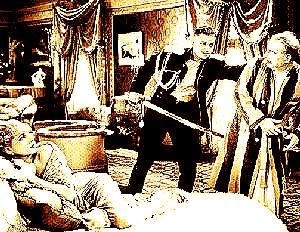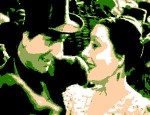Film Review

Douglas Fairbanks Jr. is appropriately cast as the handsome romantic lead, exposing his chest in a few scenes to the delight of his many female admirers (something his illustrious father would never have got away with). Although Nancy Carroll plays the most sympathetic character, and does so with some poignancy, it is the stunning Lilyan Tashman who makes the biggest impression as the voluptuous Russian femme fatale, exuding vile decadence and calculating sensuality in every shot. Not up to Dieterle's usual standards of excellence, but an engaging and well-crafted film all the same.
© James Travers 2009
The above content is owned by frenchfilms.org and must not be copied.
Film Synopsis
1917. Prince Nikiti Krasnoff is an officer in the Imperial Russian army. Shortly after returning to his native country after fighting against the Germans in WWI, Prince Nikiti finds himself caught up in the Bolshevik uprising. To save his life, the prince disguises himself as a poor Russian labourer. His loyal household servant Tanyusha conceals his identity and the two escape across the Turkish border. In Constantinople, they marry and find menial work; it is a hard life but they are content. Then, one day, Nikiti's former mistress Vera Zimina puts in an unexpected appearance. She persuades the prince to leave Tanyusha and start a new life with her in Paris. Missing the life he once knew, Nikita has no hesitation in joining Vera, but he has second thoughts when he discovers he that must sell a fake necklace to buy his passage out of Turkey...© James Travers
The above content is owned by frenchfilms.org and must not be copied.
Similar Films
Here are some other films you may enjoy watching:- Lady Oscar (1979)
- La Princesse de Montpensier (2010)
- La Reine Margot (1994)
- Queen Christina (1933)
- Sissi - Die junge Kaiserin (1956)
Other related links:
Film Credits
- Director: William Dieterle
- Script: Mary C. McCall Jr. (novel), Niven Busch, Erwin S. Gelsey, Douglas Fairbanks Jr. (dialogue)
- Cinematographer: Ernest Haller
- Cast: Douglas Fairbanks Jr. (Baron Nikita 'Nikki' Krasnoff), Nancy Carroll (Tanyusha Krasnoff), Lilyan Tashman (Vera Zimina), Guy Kibbee (Mr. Murphy), Sheila Terry (Marjorie Murphy), Richard Alexander (Ivan - Revolutionary), Hadji Ali (Turkish Landlord), Mischa Auer (Sergei - Soldier), Mae Busch (French Wedding Witness), Jack Chefe (Nightclub Guest), Harry Cording (Revolutionary), Earle Foxe (Boris - Soldier), Betty Gillette (Girl), Alphonse Kohlmar (Orthodox Priest), Lee Kohlmar (German Tailor), Arnold Korff (Kalin), William Le Maire (Revolutionary), Ivan Linow (Ivan - Revolutionary), George Magrill (Revolutionary), Eric Mayne (Doctor)
- Country: USA
- Language: English / German
- Support: Black and White
- Runtime: 57 min
The greatest French Films of all time

The brighter side of Franz Kafka

The very best fantasy films in French cinema
